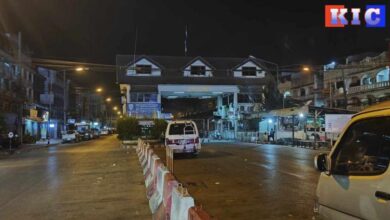Human rights shelved as Burma’s Gov’t awards mining contracts

Advocacy groups claim government’s mining decision derailing country’s democratic progress.
The Molo Women Mining Watch Network (MWMWN) and the Karenni Civil Society Network (KCSN) today strongly condemned the government of Burma’s decision to grant mining contracts inside Karenni State, an ongoing zone of conflict.
The two advocacy groups said the decision highlighted how Burma’s reformist government, led by ex-general Thein Sein, was more concerned over business interests than resolving ethnic conflict and human rights abuses.
Since a ceasefire agreement was signed between the Karenni National Progressive Party (KNPP) and the government in March 2012, there has been a large increase in the number of government awarded mining projects in Karenni State.
The number of mining projects has risen from 3 to 16 since March 2012.
Specifically, tin and tungsten mines in the mining town of Mawchi have been expanded, and new antimony, coal, galena and gold mines are operating throughout Karenni state.
According to local sources in Pasaung Township, two companies will survey and mine approximately 100,000 new acres – around 426 square kilometers – of land outside the Mawchi mining area.
This includes the Mawsaki company owned by U Tun Kyaw, a chairman of the Karenni Nationalities People Liberation Front (KNPLF), which is now acting as a government-controlled Border Guard Force (BGF), and an unknown Australian company in which Burmese movie actor Lwin Moe is involved. Additionally, the Nan Yin Mon Aung mining company and Yadana Sai Kaung Myat Kyaw mining company will jointly mine 16 new areas covering approximately 3,000 acres of land outside of the Mawchi mining area.
“The rapid mining allowed by the government before political agreement between the current government and ethnic armed groups has been a new military offensive to overrun the ethnic areas for economic exploitation and control of natural resources and has only fueled armed conflict among ethnic groups,” the MWMWN said in a statement.
Local rights groups claim that despite rich natural resources in Karenni state, local people have not benefited.
They claim that farmers have instead have lost their farmlands, mountains, rivers, livelihoods and villages due to forced relocation, land confiscation, and environment destruction related to the mining projects.
One man, a 60 year-old male villager from Keh Ma Pyu village in Pasaung Township, said, “the richness of natural resources in our state is [being used] to kill us.”
The MWMWN and the KCSN are urging Burma’s government to change tack and assure locals that all new mining projects granted since the KNPP ceasefire in March 2012 must be stopped until there is constitutional reform granting ethnic states the right to control and manage their own natural resources under a federal system of government, and ensuring local communities the right to Free, Prior and Informed Consent to any projects.




